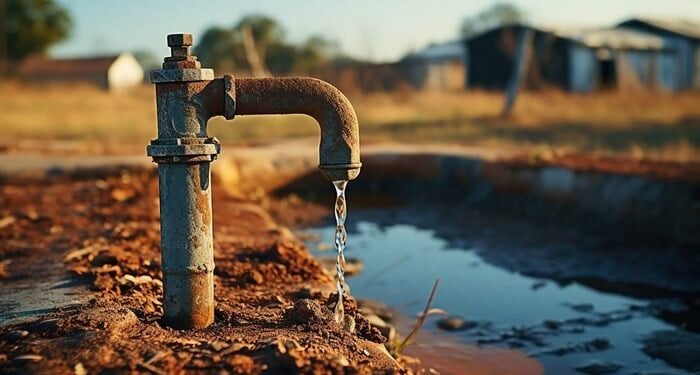On 15 February 2025, Gautrain services between Rosebank and Park Station were halted due to an illegal borehole that caused water and soil seepage into an underground tunnel. This article explores the unintended consequences of the growing water crisis in Gauteng and the interplay between public and private infrastructure across sectors.

Gauteng water crisis
Recently, Gauteng residents have faced interrupted water provision due to intermittent supply, excessive use, and ageing infrastructure. This is the latest instalment in a series of water supply issues for the City of Johannesburg. In fact, the situation is so dire that Rand Water has warned of a total system collapse and has urged consumers in Tshwane, Johannesburg, and Ekurhuleni to reduce consumption as storage levels reportedly drop at an alarming rate.
According to a system status report released by Johannesburg Water, 28 out of 61 reservoirs and towers are either critically low or completely empty, and 350 areas have been affected by outages. In October 2024, Rand Water issued a statement warning of “a real risk of supply depletion” unless municipalities implement recommendations, including the reduction of water losses, repairing of leaks, and addressing illegal activity.
Large portions of the limited supply available are being wasted, with Rand Water already extracting at maximum levels. Improperly maintained ageing infrastructure and delays in key projects are also contributing to the crisis.
Boreholes – the new solar
As a result, boreholes have become to the water crisis what private rooftop solar panels are to loadshedding. Consumers with purchasing power are choosing to spend additional money to access basic services and help to relieve demands on public infrastructure.
In 2016, Johannesburg Water partnered with the Borehole Water Association to encourage residents to switch to boreholes to save water. The City of Johannesburg has also encouraged those living in more affluent areas to install boreholes to increase the availability of municipal water for other consumers.
According to the City of Johannesburg’s Land Use Scheme, 2018, written consent from the municipality is required to install a borehole under section 14(1), and the application form is available on the City’s website.
Furthermore, municipal engineers and the Environmental Infrastructure Service Department must provide comments on whether the proposed borehole would impact existing infrastructure. Section 46 of the Gauteng Transport Infrastructure Act, 2001, provides that no person may make a structural alteration below the surface of a provincial road without the permission of the Member of the Executive Council of the Province.
With illegal boreholes reportedly increasing amidst Gauteng’s water crisis, compliance with local bylaws before drilling is crucial, as these restrictions are designed to prevent interference with existing infrastructure.
However, with long wait times for municipal consent and poor enforcement of bylaws against the backdrop of intermittent water supply, it is concerning but not surprising that illegal boreholes are becoming more commonplace.
Future of water infrastructure in South Africa
Water is becoming an increasingly pressing issue for the government.
On 27 August 2024, President Cyril Ramaphosa approved the South African National Water Resources Infrastructure Agency SOC Limited Bill (Bill), aimed at establishing the South African National Water Resources Infrastructure Agency (Agency). The Agency’s purpose is to manage and secure funding for national resources infrastructure more efficiently. Read more about both the Bill and the Agency here.
During his 2025 State of the Nation Address, President Ramaphosa acknowledged the growing water crisis and confirmed that investment in expanding water resources is a top government priority. He further mentioned that the Infrastructure Fund has secured R23bn for seven large water infrastructure projects and that delays in Phase 2 of the Lesotho Highlands Water Project and the uMkhomozi Dam have ended.
Furthermore, the National Water Resources Infrastructure Agency is due to be established within the year to increase investment in water projects, and the Water Services Amendment Bill will introduce a licensing system for water service providers and remove licenses where providers fail to meet standards for quality drinking water.
Public infrastructure and private intervention
According to Gautrain Management Agency CEO Tshepo Kgobe, the disruption caused to the Gautrain by an illegally drilled borehole has caused major inconvenience to commuters and is expected to cost over R1m in short-term temporary repairs. There is also the additional loss of revenue for Gautrain as a result of the illegal drilling activity.
However, the incident is a stark reminder of a much bigger issue: infrastructure does not exist in a vacuum, and when one sector starts to fail, there are knock-on effects on other parts of society.
For the last decade, public and private attention has been largely focused on solving the country’s electricity crisis. The Renewable Energy Independent Power Producer Procurement Programme (REIPPPP) is one of the most compelling examples of the change that can occur when government and private actors work together towards a common goal.
However, given finite resources, the country must now turn its collective attention to improving water infrastructure, which could follow a similar model.
Water producer programme
The United Arab Emirates has successfully implemented an independent water producer programme where the private sector is contracted to develop, operate, and maintain reverse osmosis plants and enter into water purchase agreements with the relevant state-owned entity.
The Department of Water and Sanitation (DWS) manages South Africa’s water resources through policy, regulation, and bulk water management, while Water Service Authorities (municipalities) deliver water services to their respective communities. Any water equivalent of the REIPPPP would likely rely on these two bodies to improve water-related services and infrastructure.
In January 2023, the DWS publicly committed to fostering more public-private partnerships to develop mega-infrastructure projects. However, there has been limited appetite for large-scale Public-Private Partnerships (PPPs) in the sector. If a focused programme similar to the REIPPPP were introduced, it would not only address growing concerns about water security but also attract investment and stimulate economic growth.
Desalination, wastewater treatment
The World Bank noted that Build-Operate-Transfer and Design-Build-Operate PPPs for desalination and wastewater treatment plants have become increasingly common in developing countries such as Mexico and Brazil.
In these cases, private funding is raised, often with the help of guarantees to mitigate risk. These projects do not present the challenge of a private party managing an existing public workforce because they are often new builds or substantially new builds. However, the country still benefits from private investment, expertise, technology, and sustainable operations.
Another growing trend internationally in the water and sanitation space is the use of performance-based contracts to address issues such as leak management and increased connectivity. The focus of PPPs of this nature is on knowledge and skills transfer, meaning that the public sector runs day-to-day operations of a utility but benefits from private sector expertise.
Municipal management
Based on its track record of successfully implemented private-public partnerships and independent procurement programmes, South Africa is theoretically well placed to address the looming water crisis. However, the Constitution states that water supply is a municipal function and therefore poses a challenge to implementing large-scale PPPs that have proven so successful internationally.
There is the possibility of individual municipalities running programmes akin to the REIPPPP within their jurisdiction, however, the potential for municipal mismanagement and the lack of requisite resources and knowledge would make it a challenging solution to implement.
What is clear, however, is that proper water management should be at the top of both government and the private sector’s agenda for the foreseeable future.













